ECO9023M Business Economics 4 Assignment Sample
Here’s the best sample of ECO9023M Business Economics 4 Assignment, written by the expert.
Introduction
Business economics refers to the field of applied economics studying the organisational, financial, and environmental or market related factors and issues faced by internal or external corporations. The impact of Covid-19 pandemic has significantly affected the levels of government borrowing within the UK for supporting the economy during the crisis. Thus, the current report is focused on understanding the major spending done by the UK government regarding the impact of Covid-19 pandemic in the country. In addition to that, different factors leading to the unfortunate situation like increased public borrowing, protection of health for the public along with the costs incurred and benefits served by the UK government shall be discussed and analysed within the report.
Impact of Covid-19 pandemic on changing roles of the UK government
The Covid-19 pandemic has significantly impacted different markets within the UK due to an economic downturn of the prevalent restrictions across the country affecting major business types. Moreover, a situation of market failure can be associated with inefficient distribution of services and goods within the free market (de Jong et al. 2018). Market failures are found to occur due to significant failure within the price mechanisms for assessing benefits and costs of consuming or providing goods. Moreover, the disruptions caused in the supply chain within the UK after the pandemic for prevalence of lockdown situations have resulted in a major market failure.
The UK economy was found to record significant reduction in GDP as it went down by 19.8% during the start of lockdown and continued to be down by 8.2% in comparison to the pre-pandemic levels (Ons.gov.uk, 2020). Furthermore, there are different sectors impacting on the overall decline of GDP rates as the food services and accommodation sector saw a decline in their services by 90% within the UK resulting in negative GDP for the country.
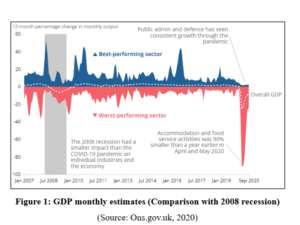
Although the public administration and defence sector saw a constant growth during the pandemic, the Covid-19 pandemic was found to be a worst hit for the UK economy and GDP growth for sectors like accommodation that could not necessarily rely on the online services for social distancing protocols. Therefore, it has emerged to change some significant roles of the UK government in response to the ongoing pandemic situation.
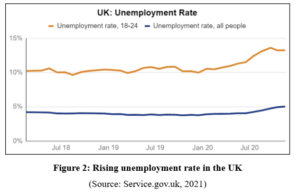
The figure depicted above highlights the increased rate of unemployment for ethnic minorities increasing from 5.8% in December 2019 to 8.5% in September, 2020 (Service.gov.uk, 2021).
The impact of the first wave of Covid-19 pandemic was tried to be mitigated through building of “herd immunity” that refers to an indirect protection from an infectious disease either through vaccination or by building immunity through widespread infections (Bhatia et al. 2020). Later on, the government was found to rectify their flawed assumption and recommended UK citizens to isolate themselves and incorporated social distancing norms through a country-wide lockdown to reduce contamination. Although, in early stages, the government was mistaken to treat the virus as common-flu, increasing demand for the ventilators and diagnostic tests during the impact of the second wave led to some significant modifications within the objectives and policies led by the government.
Therefore, the major objectives and approaches undertaken by the UK government after assessing the impact of pandemic for immediate, medium-term and long-term risks are found to be essential for the decision making. The UK government has focused on restoration of sustainable freedom towards the citizen without putting additional pressure on the NHS for avoiding occurrence of another lockdown (Service.gov.uk, 2021). Therefore, the government was found to incorporate a cautious and gradual approach in reopening the services in England with the help of data and science prioritising the restart of “face to face” teaching in schools.
Moreover, the government was also found to address employees on returning back to their offices and rules for “work from home” were lifted in January, 2022. The prime minister of the UK, Boris Johnson mentioned employees on contacting their employers on returning back to their offices (Bbc, 2022). In addition to that, the government is also focused on deploying long term contingency plans for managing any further local outbreaks associated with the outbreaks of new variants of the virus like Omicron, Delta and others. The government is also found to deploy vaccines for their citizens as quickly as possible for maximisation of protection levels and further easing of restrictions. The perspective of the UK government was found to get more people vaccinated for lowering risks to develop serious infection and requirements of hospital treatments.
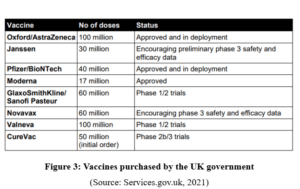
The above figure highlights the purchasing of vaccines that accounted for a total of 457 million doses by the UK government to mitigate the risk of infection among the citizens by Covid-19 virus. Furthermore, the government was found to fund a net amount of 3 billion pounds for supporting the National Health Services in housing both affected and non-affected Covid-19 patients within the UK. Moreover, to increase the status of employment generation, the workforce within the NHS was found to increase by over 48000 with inclusion of 25000 professional staff.
Costs and benefits for UK economy in having larger government role
The impact of Covid-19 pandemic was found to significantly impact the borrowing done by the UK government of 303 billion pounds, breaking all time records since the Second World War. The concerned borrowing amount was found to be focused on combating the financial crisis during the year 2020. However, the figures have also recorded 28 billion pounds spending in the tax receipts which were less by 24 billion pounds as per the budget of Office for Budget Responsibility (Theguardian, 2021).
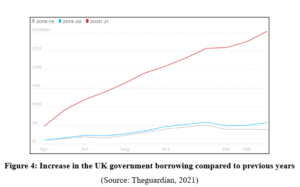
The figure depicted above shows the increase in the UK government’s borrowing trend for the year 2020-21 in comparison to the previous two years. Upon closer analysis, the national borrowing between April, 2020 to March, 2021 was found to increase by 14.5% since the second world war (Theguardian, 2021). In addition to that, the government debt borrowing accounted for 98% of the national income of the UK.
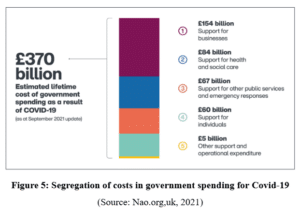
The figure depicted above highlights the cost segregation of government spending during the Covid-19 pandemic situation which amounted to a total of 370 billion pounds. Moreover, within the above spending amount, 129 billion pounds were found to be loaned from the Bank of England and spent 153.7 billion for supporting medium and small sized businesses. Moreover, 84.3 billion was spent on healthcare services, 67.2 billion for emergency and public services, 59.8 billion for supporting individual citizens and 1.6 billion pounds for other operational costs (Nao.org.uk, 2021). The concerned expenditure has significantly helped a number of people and businesses to cope with the negative economic impact of Covid-19 pandemic. However, the spending by the UK government was found to be within the budgeted expenditure and researchers suggested a return of the aforementioned government spending by end of 2025-26 annual year.
However, the UK government could have further increased benefits for the UK economy apart from raising the tax levels and tighter spending in the upcoming years, depriving UK citizens of their basic requirements. According to the words of Mawejje and Odhiambo (2020), the proper way to reduce government spending is through modulating the fiscal policy and focusing on manipulation of interest rates and issuing bond debts. Thus, the UK government could have focused on the modification of their fiscal policy to reduce their current government spending. Although, due to the sudden nature of the pandemic, they were forced to undertake the government debt However, the size of the deficit is also an essential factor in the assessment of government spending, which is not yet recorded by the UK government even after undertaking huge financial debt. Thus, as the government spending within the UK will decrease, it shall induce an increase in aggregate demand from the consumers.
Moreover, increase in demand from the consumers could have further helped the UK government to focus on increasing their revenue levels rather than switching to tougher revenue alternatives like increase in income taxes or increasing the interest rates in banks.
Conclusion
The current report has analysed upon the changing roles of the UK government during the first wave of Covid-19 pandemic in recommending isolation and social distancing to impact of second wave in recording a shortage of ventilators and medical facilities to current impacts of the Omicron variant leading to mass vaccination drives within the country. Moreover the segregation of government spending during the pandemic has been highlighted along with analysis to further reduce and help the UK economy in regaining their revenue levels.
Reference List
Bbc, (2022). Should I be working from home now? Available at: https://www.bbc.com/news/business-52567567 [Accessed on: 25/1/2022]
Bhatia, M., Bhatia, C. and Bhatia, V., 2020. COVID-19 War: United Kingdom’s Strategy During the First Wave. The International Journal of Community and Social Development, 2(3), pp.355-358.
de Jong, J.P., Gillert, N.L. and Stock, R.M., 2018. First adoption of consumer innovations: Exploring market failure and alleviating factors. Research Policy, 47(2), pp.487-497.
Gov.uk, (2022). NHS COVID-19 app: privacy notice Available at: https://www.gov.uk/government/publications/nhs-covid-19-app-privacy-information/nhs-covid-19-app-privacy-notice#:~:text=The%20digital%20contact%2Dtracing,for%20other%20app%20users. [Accessed on: 25/1/2022]
Mawejje, J. and Odhiambo, N.M., 2020. The determinants of fiscal deficits: a survey of literature. International Review of Economics, 67(3), pp.403-417.
Nao.org.uk, (2021). COVID-19 cost tracker Available at: https://www.nao.org.uk/covid-19/cost-tracker/ [Accessed on: 25/1/2022]
Ons.gov.uk, (2020). The impact of the coronavirus so far: the industries that struggled or recovered Available at: https://www.ons.gov.uk/economy/economicoutputandproductivity/output/articles/theimpactofthecoronavirussofartheindustriesthatstruggledorrecovered/2020-12-09 [Accessed on: 25/1/2022]
Service.gov.uk, (2021). COVID-19 RESPONSE − SPRING 2021 Available at: https://assets.publishing.service.gov.uk/government/uploads/system/uploads/attachment_data/file/963491/COVID-19_Response_-_Spring_2021.pdf [Accessed on: 25/1/2022]
Theguardian, (2021). Covid pushes UK government borrowing to peacetime record of £303bn Available at: https://www.theguardian.com/business/2021/apr/23/covid-pushes-uk-government-borrowing-to-peacetime-record-of-303bn [Accessed on: 25/1/2022]
________________________________________________________________________________
Know more about UniqueSubmission’s other writing services:

